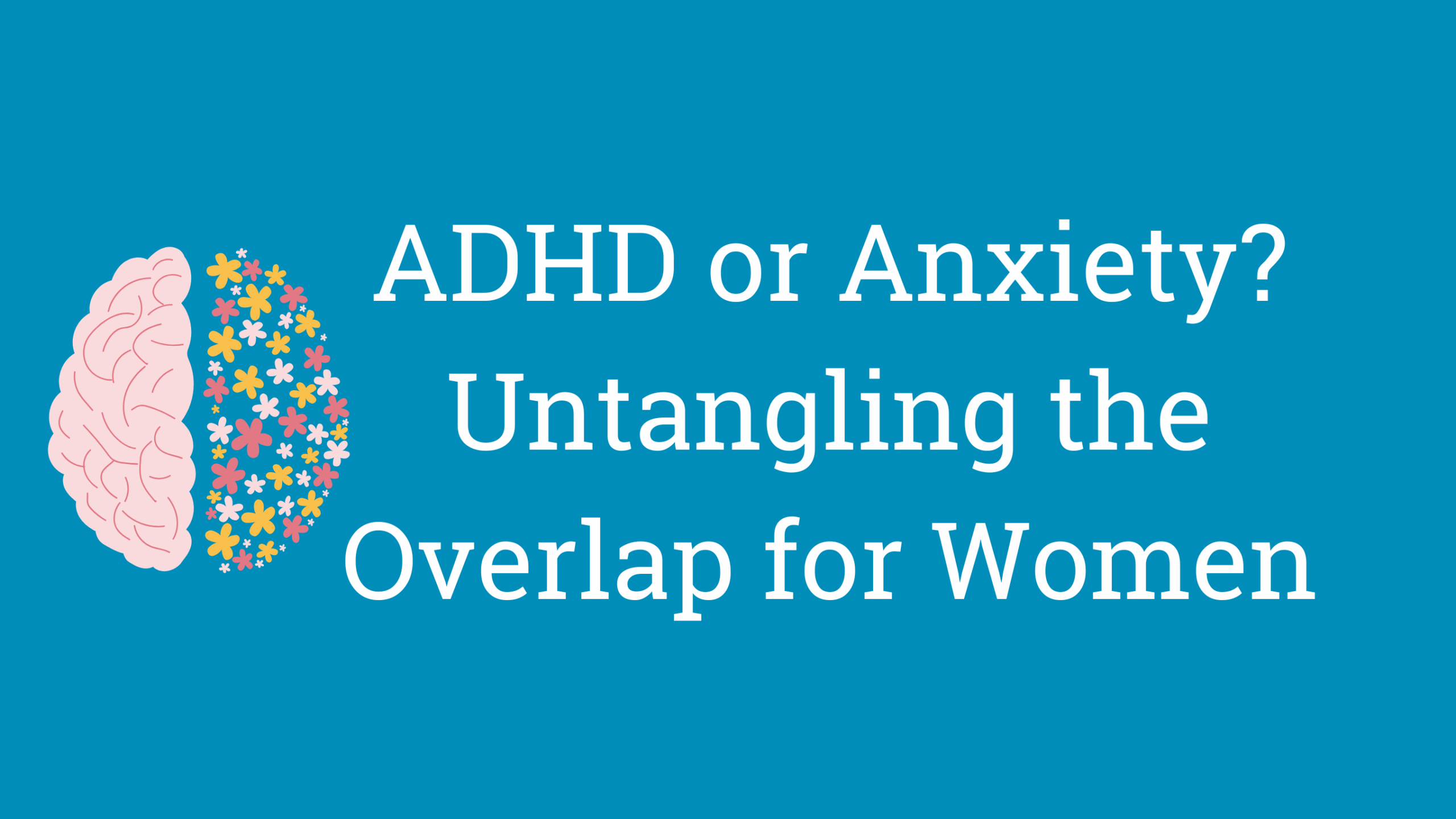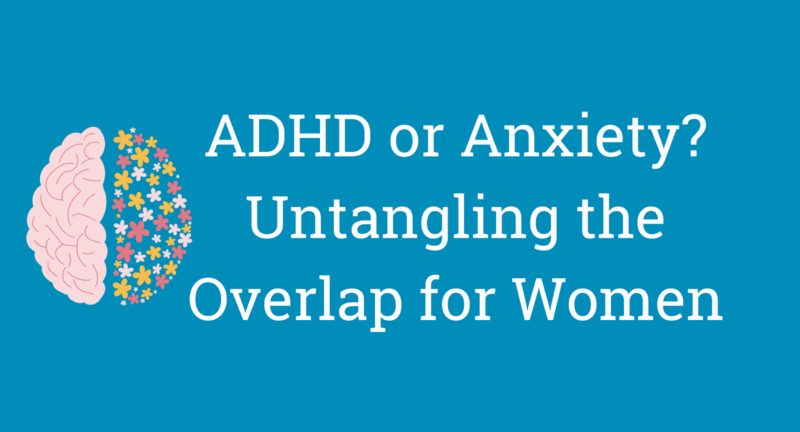
ADHD or Anxiety? Untangling the Overlap for Women
Can’t remember why you walked into the room—again? Feel like your mind’s always in overdrive, yet somehow never quite lands on what it’s supposed to? If you’re a woman juggling work, family, and expectations, you may have started to wonder: Is this anxiety? ADHD? Both? And why does it feel like nobody else is struggling quite this much?
You’re not imagining things—and you’re not alone. Many women, especially in mid-life, begin to notice difficulties with focus, forgetfulness, restlessness, or an undercurrent of worry that just won’t quit. Often, these symptoms overlap between ADHD and anxiety, and it’s easy to feel unsure of what’s really going on.
In this article, we’ll explore how these two conditions can mimic, mask, or intensify each other—especially in women. More importantly, we’ll talk about how to find clarity, and why there’s every reason to be hopeful.
Why It’s So Hard to Tell the Difference
ADHD and anxiety are distinct, but they share a lot of surface symptoms: distractibility, racing thoughts, trouble finishing tasks, irritability, sleep issues. It’s not uncommon for someone to walk into a mental health evaluation, certain they have one, only to find they actually have both—or that their struggles were misattributed all along.
One key difference lies in what’s driving the distraction. Anxiety tends to fill your mind with worry: “What if I said the wrong thing? Did I forget to follow up? What if I fail?” With ADHD, your mind may drift because it’s simply hard to stay engaged or organized—even if nothing is stressing you out in the moment.
Both can be frustrating, exhausting, and isolating. And unfortunately, women are more likely to be misdiagnosed or overlooked altogether, especially if their symptoms don’t fit the “typical” (often male) presentation of ADHD.
What ADHD Often Looks Like in Women
Women with ADHD often fly under the radar. Instead of hyperactivity, they might experience:
- Mental clutter: A brain that never seems to slow down, bouncing from one thought to the next.
- Forgetfulness: Missed appointments, lost items, conversations that drift before they’re done.
- Time blindness: Struggling to estimate how long things will take—or remember how long you’ve already been doing something.
- Emotional intensity: Feeling things deeply, and sometimes reacting quickly, even when you wish you wouldn’t.
- Chronic self-doubt: The sense that you’re always a step behind, no matter how hard you try.
Many women with ADHD become experts at compensating. They build elaborate systems, checklists, or routines to hold it all together. From the outside, it might look like they have it all under control. On the inside, it feels like they’re barely holding on.
How Anxiety Shows Up Differently in Women
While anxiety is more widely recognized, it’s not always understood well—especially when it shows up in high-achieving women who appear “fine.” Anxiety might include:
- Constant worry and second-guessing.
- Tension and restlessness that you carry in your body, even when nothing seems “wrong.”
- Perfectionism that isn’t about excellence—it’s about trying to prevent anything bad from happening.
- Irritability, exhaustion, or guilt—often from juggling too many roles or trying to meet impossible expectations.
In many women, anxiety becomes a quiet, internal pressure—rarely visible to others, but always humming in the background.
When You Have Both
ADHD and anxiety often travel together. Sometimes, anxiety develops as a response to undiagnosed ADHD. For example, if you’ve spent years missing deadlines, forgetting things, or feeling scattered, it makes sense that you’d start to worry constantly. You may have learned to expect negative feedback or disappointment—and now live in fear of the next mistake.
On the other hand, chronic anxiety can make it hard to concentrate, leading to ADHD-like symptoms. You might re-read the same email several times because your mind keeps jumping to something else. Over time, it becomes hard to tell what’s driving what.
Understanding that these conditions can co-exist—and influence each other—is a crucial part of building a treatment plan that works.
How to Move Toward Clarity
Sorting this out isn’t something you need to do on your own. A thoughtful, comprehensive evaluation with a qualified mental health professional can help you understand what’s underneath the symptoms you’re experiencing. This isn’t about putting you in a box or assigning a label—it’s about gaining insight into the patterns that have shaped your day-to-day life, so that you can make decisions with more clarity and compassion.
A good evaluation includes more than just a questionnaire. It should consider your life story, your strengths, your challenges, and how your symptoms have changed over time. It’s a conversation—not a checklist—and one that can open the door to real relief.
Treatment Can Be Life-Changing
Whether you’re dealing with ADHD, anxiety, or both, treatment can make a meaningful difference. That might include:
- Therapy, which can help you learn skills to manage thoughts, reduce overwhelm, and respond differently to stress.
- Lifestyle changes like improving sleep, building structured routines, and using technology to stay organized.
- Medication in some cases, if appropriate, to support focus or reduce chronic anxiety.
- Education and support, so you can better understand how your brain works—and stop blaming yourself.
Treament isn’t about “fixing” you. It’s about giving you tools to work with your brain instead of fighting it. Many women report a profound sense of relief when they realize they’re not lazy, flaky, or “too sensitive”—they just have a brain that’s wired differently.
You’re Not Broken—and You’re Not Alone
If you’ve spent years trying to figure out why everything feels harder than it should, wondering why you can’t just “get it together” like everyone else seems to—please know this: it’s not a character flaw. And you’re not the only one.
There are real explanations. And more importantly, there is real help.
The path forward starts with understanding. From there, you can build a plan that supports you—your brain, your life, and your goals. Whether that means learning new skills, setting better boundaries, or simply being kinder to yourself on tough days, the result is the same: more calm, more clarity, more hope.
Whatever it is you’re facing, you don’t have to figure it all out on your own. There are people who understand—and there are steps you can take today.
To schedule an appointment, click here to get started.
Related Posts
ADHD or Anxiety? Untangling the Overlap for Women
Can’t remember why you walked into the room—again? Feel like your mind’s always...
1-in-5 Recovering COVID-19 Patients Are Diagnosed with a Mental Illness Within 90 Days
A new study followed 62,354 patients who contracted COVID-19 between January and...


